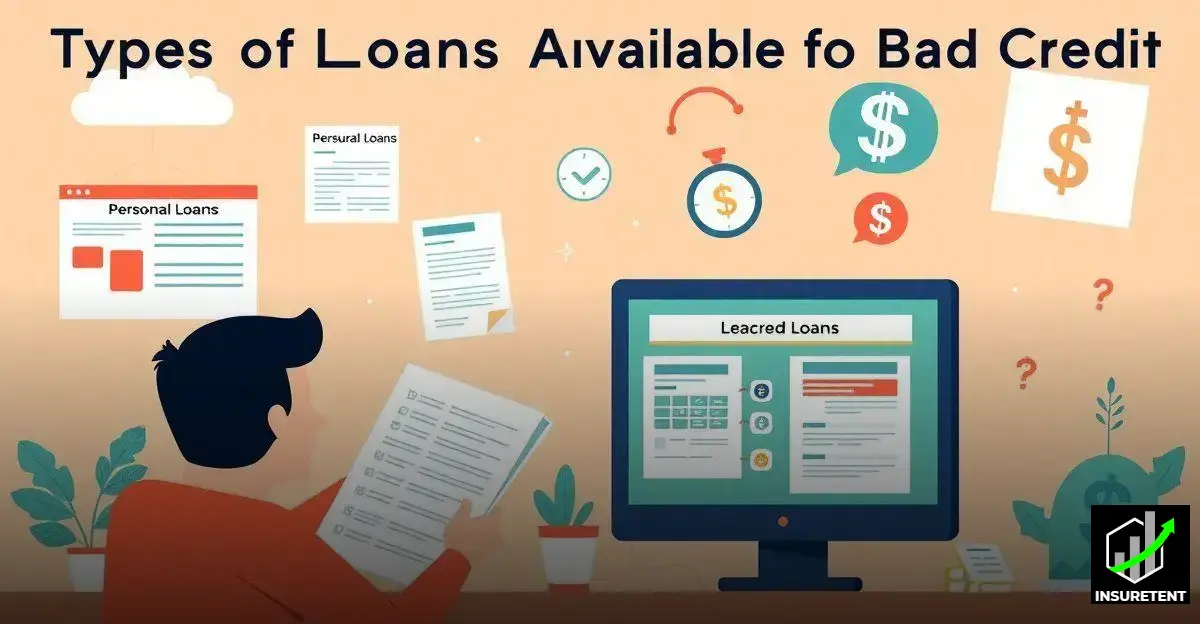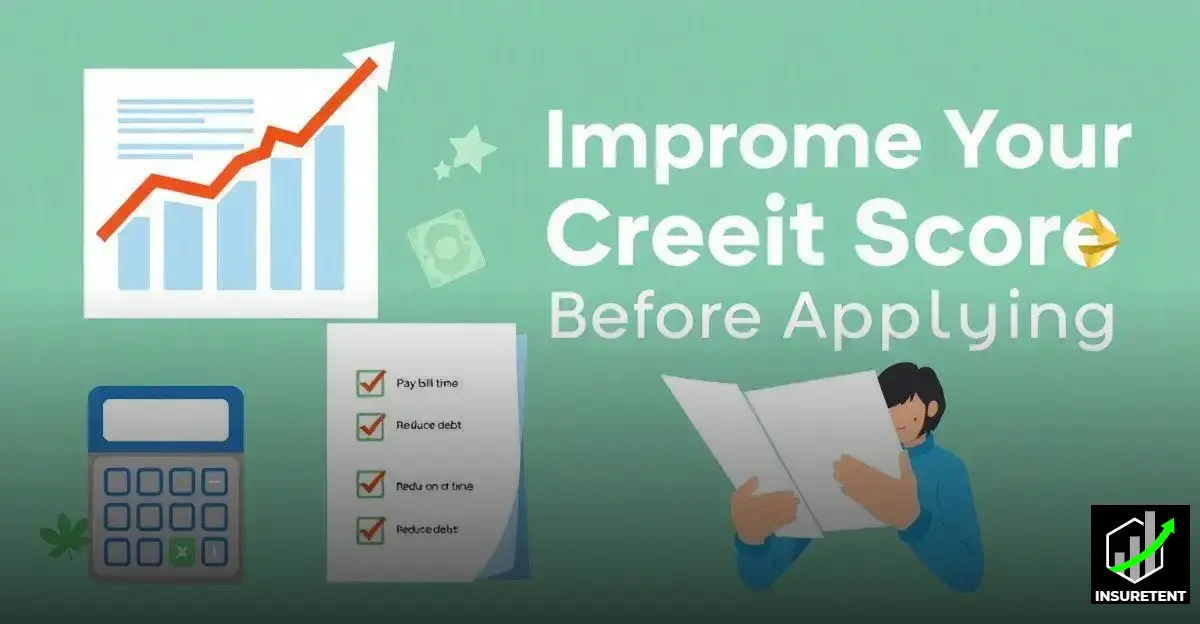Loans for bad credit can be a lifeline for individuals struggling financially. Whether you need funds for unexpected expenses or are looking to consolidate debt, understanding your options is crucial.
Understanding Bad Credit
Understanding bad credit is crucial for anyone looking to secure loans. Bad credit usually refers to a low credit score, often resulting from missed payments, high credit utilization, or loan defaults. These factors can make lenders hesitant to approve loan applications.
Credit scores range from 300 to 850, with scores below 580 generally considered poor. However, having bad credit doesn’t mean financing is out of reach. Many lenders offer loans designed for individuals with low credit scores. By understanding how your credit works and the factors that impact it, you can make more informed financial decisions.
Types of Loans Available for Bad Credit

There are various types of loans available for bad credit borrowers. These loans are designed to help individuals who struggle to get approved through traditional means. One common option is a secured loan, which requires collateral, such as a car or savings account. This collateral reduces the risk for lenders, potentially allowing you to secure lower interest rates.
Another option is an unsecured personal loan, which does not require collateral but may come with higher interest rates due to increased risk.
Payday loans are quick solutions but often come with very high fees and should generally be avoided.
Peer-to-peer lending offers an alternative, connecting borrowers with individual investors willing to fund your loan based on your credit situation.
Finally, credit unions often offer loans at more favourable terms than traditional banks, especially for those with bad credit.
How to Apply for Loans with Bad Credit
Applying for loans with bad credit can be challenging, but understanding the process can make it easier. Start by checking your credit score to see where you stand, as this gives lenders insight into your creditworthiness. If your score is low, consider improving it before applying by paying off outstanding debts or making timely payments on current loans.
Next, research lenders who specialize in loans for bad credit. While traditional banks may not be an option, credit unions and online lenders often have more flexible criteria. Prepare necessary documents, including proof of income, identification, and any assets, as these will be required for your application.
Once you’ve chosen a lender, complete the application. Be transparent about your financial situation and provide all required details. Be prepared for higher interest rates and potentially less favorable terms, as lenders perceive a greater risk.
After submission, the lender will review your application and, if approved, will inform you of the loan terms. Remember, although the process may seem difficult, there are still options available for securing loans with bad credit.
Improving Your Credit Score Before Applying

Improving your credit score before applying for a loan can greatly enhance your chances of approval. Start by reviewing your credit report for any errors or inaccuracies; you’re entitled to one free report per year from major credit bureaus. If you find any mistakes, dispute them promptly to ensure your score accurately reflects your credit history.
Next, focus on paying down existing debts to lower your credit utilization ratio. Aim to keep this ratio below 30%. Paying bills on time is essential, as timely payments significantly impact your score. Setting up automatic payments or reminders can help you stay consistent.
You might also consider becoming an authorized user on a creditworthy person’s account. This can improve your score by benefiting from their positive payment history. Additionally, diversifying your credit mix—such as adding an installment loan if you only have credit cards—can positively impact your score. Making these efforts can put you in a stronger position when it’s time to apply for loans.
Common Myths About Loans for Bad Credit
Many people believe common myths about loans for bad credit, which can mislead them in their financial decisions. One common myth is that you cannot get any loans with bad credit. This is not true. While options may be limited, there are various lenders willing to work with individuals who have low credit scores.
Another myth is that all loans for bad credit come with extremely high interest rates. In reality, some lenders may offer competitive rates depending on the individual’s situation and the type of loan. It is essential to shop around for the best rates available.
Additionally, many believe that applying for a loan will hurt their credit score. While multiple hard inquiries can slightly impact your score, doing thorough research and comparing options can be done wisely to minimise this effect.
Lastly, some think that if they have bad credit, they will never be able to improve it. However, with proper financial management, timely payments, and reducing debt, it is possible to rebuild credit over time. Recognising and debunking these myths can help individuals make informed decisions about obtaining loans for bad credit.
Alternatives to Traditional Loans

When considering options for financing, there are several alternatives to traditional loans that may suit those with bad credit. One option is peer-to-peer lending, where individuals can borrow money directly from other individuals through online platforms. This can often result in easier approval and potentially lower interest rates.
Credit unions also provide alternatives, as they typically have more lenient lending criteria compared to banks. They may offer personal loans with lower fees and interest rates built for members, which can be advantageous for those with low credit scores.
Another alternative is secured loans, where borrowers provide collateral, such as a vehicle or savings account. Because they are less risky for lenders, these loans may come with better terms, despite the borrower’s poor credit.
Finally, consider side gigs or freelance work as a source of income. While not a loan, earning additional money can help cover expenses and reduce the need for borrowing. Exploring these alternatives can open up new avenues for financial support without relying solely on traditional loans.
Tips for Managing Loans Effectively
Managing loans effectively is crucial for maintaining financial stability. Start by creating a budget that includes all your expenses and income. This will help you see where you can allocate funds towards your loan payments.
Make it a habit to pay your loans on time, as late payments can lead to additional fees and damage your credit score. Setting up automatic payments can be a good strategy.
Another tip is to avoid taking on too many loans at once. Instead, focus on one or two loans and pay them down before considering more. Always keep in communication with your lenders. If you find yourself struggling to make payments, reach out to them for assistance. They may offer solutions like payment extensions or restructuring your loan terms.
Consider making extra payments when possible. Even small additional payments can significantly reduce your principal balance and interest over time. Lastly, regularly review your financial situation and adjust your budget accordingly. Staying proactive in managing your loans will help ensure a healthier financial future.
Final Thoughts on Bad Credit Loans

When considering bad credit loans, it’s important to keep a few things in mind. First, understand that these loans can help you manage unexpected expenses but may come with higher interest rates.
Be cautious and read the terms carefully before agreeing. Many people think that loans for bad credit are their only option. However, there are alternatives that may offer better rates or terms.
Second, always prioritize making payments on time to prevent further credit damage. This simple act can significantly improve your credit over time.
Finally, remember that while loans can provide immediate relief, they should never be viewed as a long-term solution. Financial education and wise budgeting will empower you to overcome your credit challenges over time.
Final Thoughts on Loans for Bad Credit
Loans for bad credit can offer a way out for those facing financial strains, but they come with important responsibilities. Understanding the terms and interest rates is crucial before accepting any loan.
It is essential to manage these loans wisely, making timely payments to improve your credit score over time. Explore all options including alternatives to traditional loans that may provide better terms.
With the right approach to budgeting and financial management, you can turn your financial situation around. Remember, securing a loan should not just be a quick fix; rather, it should fit into a larger strategy for financial health.
